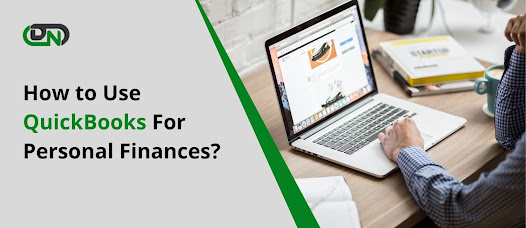How to Use QuickBooks For Personal Finances?
Are you
struggling to keep track of your personal finances? Do you find yourself
drowning in receipts, bills, and spreadsheets? Well, fret no more! QuickBooks
is here to save the day. You may have heard of QuickBooks as a popular
accounting software for businesses, but did you know that it can also be used
for personal finance management? In this blog post, we’ll show you how to use
QuickBooks to organize your finances and take control of your money. So grab a
cup of coffee and let's get started on our financial journey together with the
help of QuickBooks!
What is QuickBooks?
QuickBooks
is an accounting software developed by Intuit. It is primarily designed for
small businesses to manage their finances, but it can also be used for personal
finance management. QuickBooks offers a range of features that help you track
your income and expenses, create budgets, pay bills, generate reports, and
more.
One of the great things about QuickBooks is its user-friendly interface. The
dashboard provides a snapshot of your financial health with key metrics such as
income vs expenses, account balances, and upcoming bills. You can easily
navigate through various functions using the menu bar on top.
QuickBooks has different versions tailored to specific needs; there's
QuickBooks Self-Employed for freelancers or independent contractors who need to
keep track of their business expenses and taxes; QuickBooks
for personal finance Online which allows for easy access from anywhere in
the world; and QuickBooks Desktop which offers more advanced features like
inventory tracking.
Quickbooks is an excellent tool that simplifies financial management tasks by
automating them. Its cloud-based service makes it accessible anytime and
anywhere so that users can remain up-to-date with transactions all over the
globe at any given time without much hassle.
How to use QuickBooks for personal finances?
QuickBooks
is a powerful tool for managing personal finances. Whether you are
self-employed, running a small business, or just want to keep track of your
personal expenses, QuickBooks can help you organize your financial data in one
place.
First, start by setting up your accounts in QuickBooks. Create different types
of accounts such as checking, savings, and credit card accounts. This will make
it easy for you to categorize transactions later on.
Next, enter all of your financial transactions into QuickBooks such as income
and expenses. You can even link your bank account to automatically import
transactions and reconcile them with the correct accounts.
To set up budgets in QuickBooks, simply create a budget category and assign an
amount that you plan to spend within that category each month or quarter. This
will help you stay on track with your spending goals.
When it comes time to pay bills, use the bill payment feature in QuickBooks to
quickly pay vendors directly from the software. You can also schedule recurring
payments so that bills are paid automatically each month.
Take advantage of the various reports available in QuickBooks such as profit
and loss statements, balance sheets, and cash flow statements. These reports
provide valuable insights into how much money is coming in versus going out so
that you can make informed decisions about your finances moving forward.
What are the different types of accounts in QuickBooks?
QuickBooks
allows you to create different types of accounts based on your personal
financial needs. These accounts are used to track and manage your income,
expenses, assets, liabilities, and equity.
The first type of account is the bank account. You can set up multiple bank
accounts in QuickBooks to track transactions such as deposits, withdrawals, and
transfers between accounts. The credit card account is another type that tracks
all credit card purchases and payments.
Next comes the asset account that tracks items with value like vehicles or
property. In contrast to this liability accounts keep hold of debts like loans
or mortgages.
Equity accounts help balance out the books for both sides so they should be
utilized fully too!
You can also create income and expense categories – these are called revenue
and expense accounts – in order to categorize where money is coming from or
going towards respectively!
There are a variety of different types of accounts available within QuickBooks
accounting software that allow users complete control over their finances!
How to enter and track your transactions in QuickBooks?
Entering
and tracking your transactions in QuickBooks is vital to keeping an accurate
record of your personal finances. Here's how you can do it:
First, navigate to the "Banking" tab on the quickbooks
personal finance dashboard, and select "Add Account" to add your
financial accounts. Once added, all transactions will automatically sync with
QuickBooks.
Next, review each transaction for accuracy and categorize them into appropriate
income or expense categories. This helps ensure that your reports accurately
reflect your spending habits.
You can also create custom categories if needed, such as adding a category for
a side hustle or freelance work income.
QuickBooks also allows you to split transactions between multiple categories if
necessary. For example, if you made a purchase at a store that included both
groceries and household items, you can allocate the correct amounts under their
respective categories.
Be sure to reconcile your accounts regularly by checking off matching
transactions in QuickBooks against statements from banks or credit card
companies. This keeps everything up-to-date and prevents errors from
accumulating over time.
How to set up budgets in QuickBooks?
Setting
up budgets in QuickBooks is a crucial step to help you manage your personal
finances efficiently. With the budgeting feature, you can keep a close eye on
your income and expenses, control overspending, and make more informed
financial decisions.
To create a new budget in QuickBooks, go to the Budgets menu and select
"Set Up Budgets." Then choose the fiscal year for which you want to
set up a budget. You can either create an annual or monthly budget depending on
your preferences.
Next, select the type of budget that suits your needs. You can choose from
Profit & Loss, Balance Sheet, or Customer/Job. Once selected, enter all
relevant data such as projected income sources and estimated expenses for each
category.
After entering all necessary information into QuickBooks' system, click
"Save" to save your newly created personalized budget plan. Now you
have a clear picture of how much money you have coming in versus what's going
out each month/yearly basis.
In conclusion, implementing this simple yet effective strategy will help ensure
complete success with managing personal finances using QuickBooks!
How to pay your bills in QuickBooks?
Paying
bills is a necessary part of managing personal finances. QuickBooks provides an
easy and efficient way to pay your bills directly from the software.
To get started, you will need to set up your vendors in QuickBooks. Once you
have entered their information, you can easily create bills for each vendor as
they come due.
When it's time to pay your bills, simply go to the Pay Bills window and select
the vendor and bill that you want to pay. You can choose which account to use
for payment and even schedule the payment for a later date if necessary.
QuickBooks also allows you to track your expenses by category, making it easier
to see where your money is going each month. This feature can help identify
areas where you may be overspending or where you could cut back on expenses.
Another helpful tool within QuickBooks is the ability to set up recurring
payments for bills that are due on a regular basis such as rent or utilities.
This saves time and ensures that payments are made consistently each month.
Paying bills in QuickBooks is simple and convenient. It helps streamline
personal finance management while providing valuable insights into spending
habits.
What are the different reports available in QuickBooks?
QuickBooks
offers a variety of reports that can help you with your personal finances.
These reports provide insight into your financial situation, allowing you to
make informed decisions about budgeting, investing, and saving.
One of the most useful reports is the Profit & Loss report. This shows how
much money you've earned and spent over a certain period of time. You can use
this report to track trends in revenue and expenses, as well as identify areas
where you may be overspending.
Another important report is the Balance Sheet. This provides an overview of
your assets, liabilities, and equity at a given point in time. It's helpful for
understanding your overall financial position and tracking changes over time.
QuickBooks also offers several cash flow reports that show how money is flowing
in and out of your accounts. The Statement of Cash Flows tracks operating,
investing, and financing activities separately so you can see where money is
coming from and going.
There are various expense reports available that allow you to drill down into
specific categories or transactions. These include Expense by Vendor Detail,
Expense by Account Summary, Unbilled Costs by Job, etc.
QuickBooks' reporting features give users a holistic view of their finances
which empowers them when making investment decisions or other financial
arrangements based on concrete data evidence captured through these tools
offered within the Quickbooks platform.
QuickBooks
Online resources
Read more about how to upgrade QuickBooks Latest version
Upgrade
QuickBooks to Latest Release
Upgrade
QuickBooks 2019 to 2022
Upgrade
QuickBooks 2021 to 2022
Upgrade
QuickBooks 2020 to 2022
Upgrade
QuickBooks 2018 to 2021
Conclusion
QuickBooks
is an excellent tool for managing personal finances. With its user-friendly
interface and easy-to-use features, it makes tracking and organizing your
financial information a breeze. Whether you're running a small business or
managing your own personal finances, QuickBooks has everything you need to stay
on top of your money.
By setting up different accounts, entering and tracking transactions, creating
budgets, paying bills, and generating reports; you can manage your finances
like never before. You'll be able to see where your money is going and make
informed decisions about how to best use it.
So if you're looking for a simple yet powerful way to manage your personal
finances, give QuickBooks a try! It's the perfect solution for anyone who wants
to take control of their money and achieve their financial goals.



Comments
Post a Comment